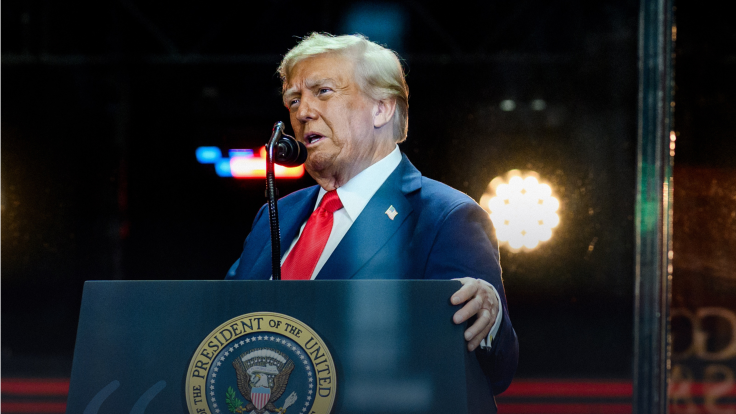Rally or Funeral? Trump Slammed for Turning Charlie Kirk Memorial into Campaign Spectacle with Fireworks
What was meant to honour conservative activist Charlie Kirk in Arizona spiralled into a Trump-centred political event complete with fireworks, speeches, and fresh controversy.

What was billed as a solemn farewell to conservative firebrand Charlie Kirk quickly morphed into a high-octane political rally, blurring the line between tribute and campaign spectacle.
Tens of thousands packed State Farm Stadium on Sunday to honour the 31-year-old Turning Point USA founder, but it was Donald Trump's fiery appearance that stole the spotlight and drove the headlines.
A Memorial Wrapped in Pageantry
Flanked by key figures of his Make America Great Again movement, Trump led a tribute that looked as much like a campaign event as a memorial.
Supporters waved American flags and MAGA banners as giant screens blared slogans and video montages of Kirk's activism, turning the send-off into a blend of mourning, patriotism and political theatre.
However, the event quickly drew scrutiny online when pyrotechnics and sparklers were lit on stage. The visual display, coupled with Trump's frequent references to political rivals and policy achievements, prompted critics to label the memorial a campaign show.
'Why in God's name are there sparklers on stage at a funeral?' asked commentator Chris D. Jackson on X, formerly Twitter. Another user argued, 'This is not a memorial service. It's a propaganda rally.'
Even among those attending, reactions were mixed. While some cheered the theatrical approach as fitting for Kirk's larger-than-life persona, others were visibly unsettled by the blending of grief and political messaging in a stadium setting.
Why in God's name are there sparklers on stage at a funeral? pic.twitter.com/LLltULmYo0
— Chris D. Jackson (@ChrisDJackson) September 21, 2025
Memorial services are not held at stadiums.
— Andrew—#IAmTheResistance (@AmoneyResists) September 21, 2025
This is not a memorial service.
It’s a propaganda rally.
Not only are they milking this guy’s death for every last drop of power and money and influence they can, they are weaponizing it in every way possible.
It’s absolutely sick. https://t.co/DPOGjqKqGB
This wasn’t about honoring a young man’s life of political service.
— Morgan (@MorganC000) September 21, 2025
It was a rally.
It was mass conditioning through weaponized faith, with death repackaged as a “turning point.”
A 10 hour stadium revival stitched together from nationalism, the glorification of military… pic.twitter.com/eIjFRVomPU
🚨 At Charlie Kirk’s funeral, Trump announced the “biggest medical breakthrough in U.S. history” and claimed they “found an answer to autism.”
— Brian Allen (@allenanalysis) September 21, 2025
Bro, its a funeral 💀
This wasn’t a eulogy. It was a campaign teaser. Even in death, it’s still all about him. pic.twitter.com/YamqWweEUd
Trump's Eulogy: Condolences Mixed With Criticism
Trump praised Kirk for his leadership and his role in uniting MAGA supporters, calling him a "singular force" whose work must continue. He lauded Kirk's widow, Erika, who delivered an emotional eulogy and received a standing ovation after forgiving her husband's killer.
Yet Trump's remarks quickly veered into political territory. He criticised former President Joe Biden, rebuked Illinois Governor JB Pritzker as 'incompetent,' and attacked late-night hosts who allegedly mocked Kirk's death.
In a forceful moment, Trump called for the death penalty against Kirk's accused assassin, stating: 'God willing, he will receive the full and ultimate punishment for his horrific crime.'
The president also highlighted his administration's policy priorities, teasing a major announcement on autism research and referencing initiatives in crime reduction, citing successes in Washington D.C.
Trump's remarks often merged campaign-style rhetoric with the solemnity of the memorial, further blurring the line between tribute and political performance.
Praise, Outrage, And Debate
The memorial sparked widespread discussion online. Supporters praised Trump for honouring Kirk's legacy and energising young conservatives, viewing the spectacle as a reflection of Kirk's impact and charismatic style.
They argued that a traditional, quiet funeral would not have adequately captured the activist's influence.
Conversely, detractors condemned the event as political exploitation. Social media users questioned the appropriateness of fireworks, stadium rallies, and public policy discussions at a funeral.
'They are weaponising this man's death in every way possible. It's absolutely sick,' tweeted Andrew, a vocal critic. Others warned that such displays risked deepening divisions in an already polarised political climate.
The Lasting Image Of Kirk's Memorial
Despite the controversy, the service emphasised Kirk's influence on conservative politics, his faith, and his commitment to engaging young Americans.
For many in attendance, the blend of tribute and spectacle captured the energy he embodied throughout his life. Yet the widespread criticism underscores the delicate balance between mourning and messaging when political figures take centre stage.
© Copyright IBTimes 2025. All rights reserved.





















